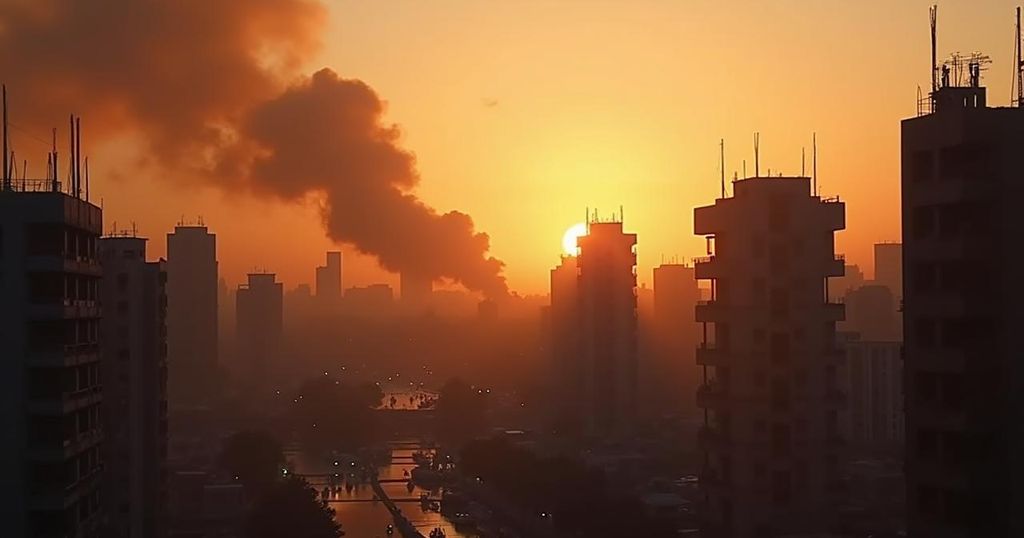Intensified Israeli Airstrikes in Lebanon: Netanyahu’s Call for Action Against Hamas and Hezbollah

Israeli airstrikes have devastated parts of southern Beirut and other areas in Lebanon, leading to high civilian casualties amidst claims of fighting against Hamas and Hezbollah threats. Israeli Prime Minister Benjamin Netanyahu has stated that Hamas must be eradicated to ensure Israel’s safety, emphasizing continued efforts against Iranian influence and local militias. Massive humanitarian concerns are emerging due to significant loss of life and displacement.
Israel has intensified its military operations in Lebanon, conducting numerous airstrikes that have resulted in significant casualties and destruction. The assaults are part of a broader campaign against Hamas and Hezbollah, with Israeli Prime Minister Benjamin Netanyahu adamantly stating that Hamas must be eliminated to prevent future threats to Israel. Netanyahu highlighted the urgency of dismantling Hamas, asserting that if the group remains in power, it poses a continuous danger to Israel and regional stability. He vowed to degrade Hezbollah as well, indicating that Israeli military actions would persist until its objectives are reached along the Lebanese border. In a recent address at the UN General Assembly, Netanyahu framed Israel’s military actions as a necessary measure for national defense against what he termed “savage murderers” who threaten to undermine civilization and plunge the region back into chaos. Netanyahu emphasized the dangers posed by Iran, which he accused of sponsoring terrorism in the region and asserted that any attacks on Israel would elicit a formidable response. Speaking on the escalating violence, he drew a parallel to a hypothetical scenario wherein American cities were targeted, alluding to what he perceives as an untenable situation that has persisted for too long in Israel. While conditions in Lebanon deteriorate, major humanitarian concerns have emerged as cities bear the brunt of airstrikes, leading to civilian casualties and widespread destruction. The immediate aftermath of the strikes has seen over 41,000 reported deaths in Gaza and at least 700 in Lebanon. Philippe Lazzarini, head of the UN agency for Palestinian refugees, stressed the importance of ensuring aid and rebuilding efforts post-war while contending with severe funding shortages. The ongoing violence necessitated mass evacuations, with many civilians seeking refuge in schools and other facilities across Lebanon, as fears of escalating conflict linger amidst calls for international intervention and ceasefire.
The resurgence in hostilities between Israel and Hezbollah, as well as Hamas, follows a prolonged period of tension in the region marked by sporadic violence and political stalemate. The Israeli government, led by Prime Minister Netanyahu, has adopted a hardline approach to neutralizing threats from both groups, which it accuses of engaging in terrorism against Israeli civilians. Recent events, including airstrikes in southern Beirut’s Dahiyeh suburb, underscore the dire humanitarian situation faced by many in Lebanon and Gaza amidst escalating violence. This backdrop highlights the urgent need for a comprehensive resolution to the ongoing conflict, which continues to draw in regional and international discourse on security and humanitarian concerns.
In conclusion, the situation in Lebanon has reached a critical point as Israeli airstrikes amplify the humanitarian crisis exacerbated by ongoing hostilities with Hamas and Hezbollah. Prime Minister Netanyahu’s declarations at the UN reinforce Israel’s resolve to eliminate perceived threats, while the international community faces pressing challenges regarding funding and the potential for renewed violence. The need for a sustainable and peaceful resolution is paramount as civilian suffering mounts and the regional security landscape grows increasingly volatile.
Original Source: www.aljazeera.com








